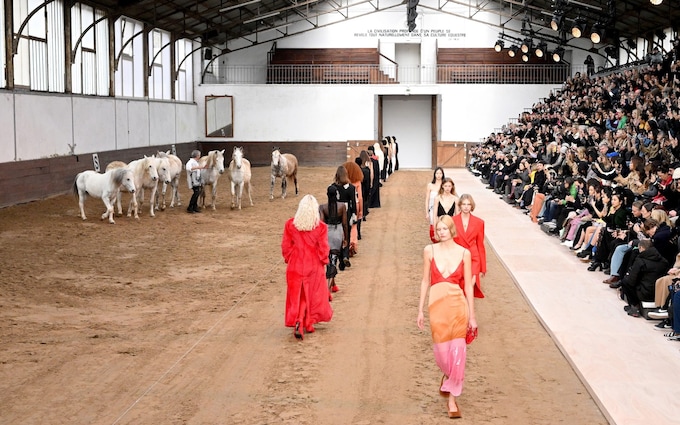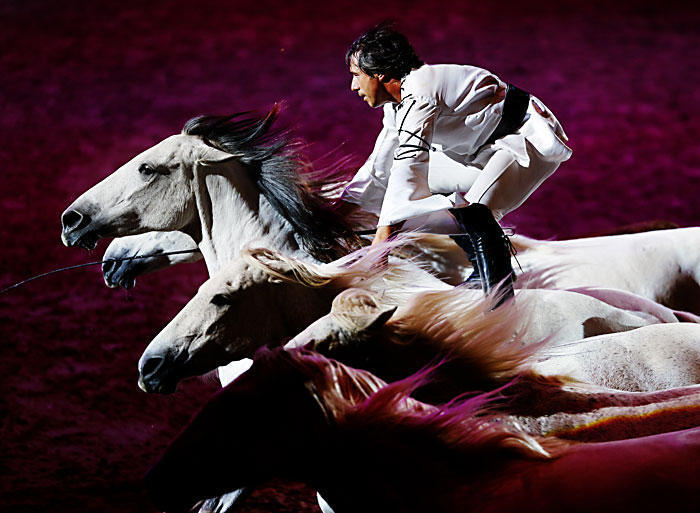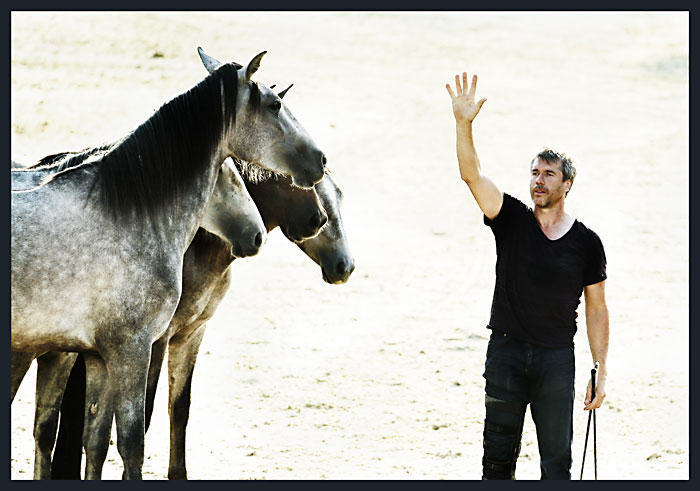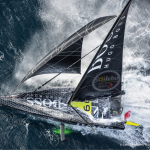Free roaming horses that move as if they were led by invisible strings have become synonymous with the legendary equestrian performer, Jean Francois Pignon.
By Camilla Alfthan
“BASICALLY, I try to show people a part of nature – a stallion, mares and foals, and that is my goal with the shows where horses roam freely,” tells the softly spoken Frenchman over a glass of wine before going in the ring with his show, Horse Music.
The venue is a five star show jumping event with luxury brands strewn all over the place. As a contrast to the lavish surroundings the celebrated horseman is remarkably low key.
Unlike any other rider, Jean Francois Pignon does not work with reins, nor does he use a saddle.
“In my life I was always more or less guided without having to step back and think,” he tells. “It all began one autumn after school when I did’nt have too much time to look after my mares because the evening came fast. I wanted to play with them and didn’t have the time to brush them or put on a saddle. In fact, I learned to ride without a saddle because my father did not have the means to buy one. And I think he thought it was a good way to learn to improve my balance. Afterwards, I found myself working with the horses in the same way.
So without reins, how do you communicate ? What are the brakes and the steering wheel? In the beginning I fell in the trap using words that my father was using, certain words that indicated what the horses had to do. Then I began to observe them and I realized that they don’t communicate like that. Whenever you see a herd move it happens silently. How does the leader tell them, now we move? It’s much more subtle than using words or sounds. Humans are intelligent enough to say that if they go to England it helps to speak English, if they want to talk with me it’s better if they speak a minimum of French and we haven’t thought about the horses in the same way.
With them we speak a human language. I wanted to do the contrary, I wanted to understand the subtleness of the horse.
At first I tried to use a few words that were strong and precise. But a little over a decade ago, I said to myself that I really want to communicate only through movements.
“Whenever you see a herd move it happens silently. How does the leader tell them, now we move? It’s much more subtle than using words or sounds.”
That destabilized me in the beginning because I got used to clicking my tongue like any rider usually does. The first time it didn’t go as well because the horses were used to a certain dialogue between us, to which they responded very well, and when I wanted to go deeper into this subtle langue I felt less sure about myself and the horses were a little bit confused. So we regressed a little.
But I had a new horse, who – unlike the others – did not know his name. All the others would respond to their names but he did not know his, and he was always observing my movements to know what to do and that reassured me. While the others were a little bit confused, he was observing me all the time to read my movements. So I stayed on this track.
Now I have a special relationship with my new horses and I feel that we’ve come further than the others who were used to my voice. I even feel less uncomfortable.
“My dad taught me one thing which is very interesting and important – that the animal must respect you. I find that is the base.”
Is there a hierarchy where you work with the leader of the herd so that the rest will follow him when he follows you? No, you really need to have a relation to each individual horse. Only when you have that you can put them in a group, because once you do so, they have a tendency to slide away because of their natural hierarchy.
So it is only by having a relation with those who are in the lower echelon of the hierarchy that you can make them come next to the dominant horse, that they feel, it is OK because they are protected by me.
So are you their leader ? No, I’m a human being among the horses. But I believe strongly in God and think I was made to be dominant over the animals – especially the horses. So I won’t abuse of this power; I want to respect them and believe in this gift that I was born with.
It began years ago with your mare Gazelle from Camargue. Exactly, I became very interested in horses when I had her, contrary to football where everyone was measuring one another and I needed to prove myself to my friends on the field. With Gazelle I could be very tired and I wasn’t judged by her in any way, she made me feel really good.
Later, when I found faith in God it completely changed my life. He made me understand that loving horses is a good thing but you must not forget to love the humans, too.
So you’re very religious ? No, not religious, certainly not. Because religions are the source of many wars and it’s not very playful. One of the most important phrases in the Bible is to love your neighbour as you love yourself. Religions make war and they often make mistakes. I believe too much in God to be religious.
I really want to love my neighbour, even if he doesn’t think like I do. If theres a lack of respect I will retreat, and the same goes for the horses. The horses that don’t respect me don’t have the right to come next to me. I always put them a little bit behind the others. My goal is to be in harmony with horses and the people.
How long does it take to train the horses? Does it only work with some of them ? It works with all horses which is extraordinary. To make a horse take interest and follow me usually takes one hour.
What do you think about the way the equestrian scene has developed in recent years? The horse adapts very well to all changes. There are many methods and you need everything to make the world. The Bible has taught me about tolerance and love, and everyone has their own ways, if it is jumping bars or racing a horse. I like what others do, too, and I don’t want them to do the same as I.
At l’Ecole Militaire in the heart of Paris, the horses were a relaxed backdrop to Stella McCartney’s latest collection.
How do you get new ideas to innovate your shows ? Well, it’s funny; my inspiration comes when I clean out boxes when we’re on the road. It’s a manual work that I dont have to think about and my ideas come at that moment and, of course, also when I pray. Whereever I go the language of the horse is universal. We entertain people and I’m also enjoying myself.
Do you ever use tack when at home ? No, the horses are nude. I’m dressed. I feel their warmth against me – we become one.” ©





